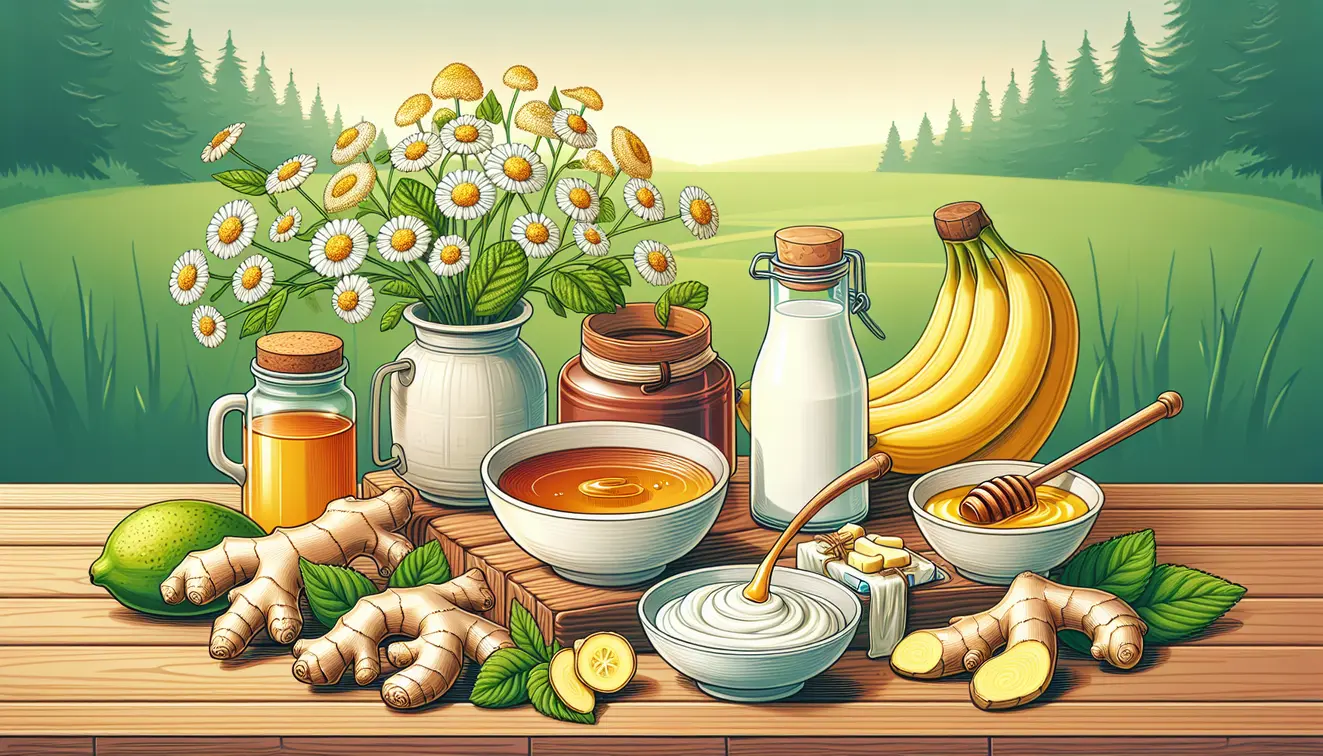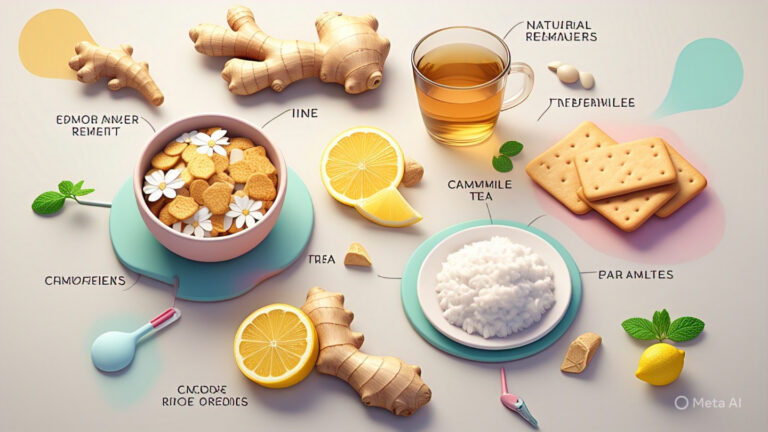Home Remedies for Gastritis: Your Comprehensive Guide to Natural Relief
Estimated reading time: 10 minutes
Key Takeaways
- Gastritis, inflammation of the stomach lining, can often be eased with simple home remedies.
- Natural options like ginger, chamomile, and probiotics may reduce irritation and discomfort.
- Dietary and lifestyle changes play a critical role in managing symptoms alongside remedies.
- Always prioritize safety—seek medical help for severe or persistent symptoms.
- Scientific studies support some remedies, but they’re best used as complementary tools.
Table of Contents
- Introduction to Gastritis and Natural Relief
- Understanding Gastritis: Causes and Triggers
- Top 10 Home Remedies for Gastritis Relief
- Dietary Tips for Managing Gastritis
- Lifestyle Changes to Support Gastritis Relief
- Safety and Precautions for Home Remedies
- Scientific Backing for Home Remedies
- Frequently Asked Questions (FAQs) About Gastritis Remedies
Introduction to Gastritis and Natural Relief
Welcome to a journey toward soothing your stomach with nature’s touch. Gastritis, an inflammation of the stomach lining, often brings discomfort through pain, nausea, or bloating. Millions worldwide grapple with this condition, as noted by the National Institutes of Health (NIH), making it a common yet troubling issue.
For mild cases, home remedies offer a gentle path to relief. These natural solutions are often within reach, right in your kitchen or local store. They provide comfort without the immediate need for synthetic options. Here at WikiHomeRemedies, our goal is to share safe, effective ideas grounded in credible insights from sources like the Mayo Clinic and WebMD.
This guide is your companion to understanding and easing gastritis naturally. While we dive into practical solutions, remember that severe symptoms call for a doctor’s care. Let’s explore what causes this condition and how you can address it with confidence, starting with a closer look at gastritis itself. For related digestive discomforts, check out our guide on natural solutions for acid indigestion.
Understanding Gastritis: Causes and Triggers
Gastritis can stem from various sources, often catching us off guard. It’s the irritation or swelling of the stomach lining that disrupts daily comfort. Knowing what sparks this condition helps in choosing the right remedies and making lasting changes.
Many factors can lead to gastritis, from infections to daily habits. A common culprit is Helicobacter pylori (H. pylori), a bacterium affecting nearly half the global population, according to the NIH. Other triggers include heavy alcohol use, ongoing stress, or frequent reliance on pain relievers like NSAIDs. These elements weaken the stomach’s protective layer, inviting inflammation.
Then there are lifestyle and dietary choices that worsen the issue. Spicy dishes, excessive caffeine, or smoking can irritate the stomach further. Even irregular eating patterns, like late-night meals, play a role. Pinpointing these aggravators is the first step to tailoring relief. Let’s break them down further to see how they impact your health and what you can do next. If you’re also experiencing heartburn alongside gastritis, explore additional relief options at natural relief for heartburn.
Common Causes of Gastritis
Several underlying issues often lead to gastritis, and recognizing them is key:
- H. pylori Infection: This bacterium, noted by the World Health Organization as a primary cause, burrows into the stomach lining, sparking inflammation.
- Alcohol Consumption: Regular or heavy drinking erodes the stomach’s protective barrier over time.
- Chronic Stress: Prolonged tension can increase stomach acid, irritating the lining.
- NSAID Overuse: Pain relievers like ibuprofen, when used often, can harm the stomach wall.
- Autoimmune Disorders: In rare cases, the body attacks its own stomach lining, leading to discomfort.
These causes often intertwine with daily habits. Addressing them can prevent flare-ups and pave the way for healing.
Dietary and Lifestyle Triggers
Certain foods and routines can heighten gastritis symptoms, making awareness crucial:
- Spicy Foods: Dishes heavy with chili or pepper can inflame an already sensitive stomach.
- Acidic Items: Citrus fruits or tomatoes might aggravate the lining with their natural acidity.
- Caffeine Overload: Coffee or energy drinks in excess can boost acid production.
- Smoking: Tobacco smoke directly irritates the stomach and delays healing.
- Irregular Meals: Skipping meals or eating late at night disrupts digestion.
Noticing these patterns, as supported by general advice from WebMD, helps in crafting a calmer digestive environment. Let’s now explore natural ways to ease the discomfort these triggers cause. For broader digestive upset, you might find helpful tips in our article on remedies for a bad stomach.
Top 10 Home Remedies for Gastritis Relief
Finding relief from gastritis doesn’t always mean reaching for a prescription. Nature offers several tools to calm your stomach when symptoms strike. Below, we’ve gathered ten remedies backed by tradition and science, often supported by studies from places like the NIH. Each comes with simple steps to use them safely. Let’s walk through these options together.
1. Ginger for Stomach Soothing
Ginger has long been cherished for calming digestive woes. Research from PubMed highlights its ability to reduce inflammation, making it a fitting choice for gastritis.
- Benefits: It eases irritation and may lessen nausea with its natural compounds.
- How to Use: Steep a teaspoon of fresh grated ginger in hot water for 10 minutes. Drink this tea once or twice daily, ideally before meals.
- Precautions: Don’t overdo it if you’re on blood thinners, as ginger can amplify their effect.
This root is a gentle way to start soothing your stomach. Keep it handy for quick relief.
2. Chamomile Tea for Calming Irritation
A warm cup of chamomile tea can feel like a hug for your stomach. It’s known for reducing tension and irritation, often linked to gastritis discomfort.
- Benefits: It helps relax the stomach muscles and may lower stress.
- How to Use: Steep a chamomile tea bag or a tablespoon of dried flowers in hot water for 5-7 minutes. Sip slowly, especially in the evening.
- Precautions: Watch for allergies if you’re sensitive to plants like ragweed.
This remedy doubles as a calming ritual. It’s perfect for unwinding while aiding digestion.
3. Probiotics (Yogurt) for Gut Balance
Yogurt with live cultures brings friendly bacteria to your gut. Studies suggest probiotics might even counter H. pylori, a key gastritis trigger.
- Benefits: They help restore balance to your digestive system, supporting overall gut health.
- How to Use: Choose plain, unsweetened yogurt and eat a small bowl daily. Add a few berries if you’d like a touch of flavor.
- Precautions: Skip this if lactose bothers you, as it could worsen symptoms.
It’s a simple addition to your routine. Think of it as rebuilding your stomach’s defense.
4. Honey for Antibacterial Support
Honey isn’t just a sweetener; it’s a natural healer for the stomach. Its properties can shield the lining and fight off harmful bacteria.
- Benefits: It coats the stomach for protection and may hinder bacterial growth.
- How to Use: Stir a teaspoon into warm water or herbal tea. Take it first thing in the morning.
- Precautions: Never give honey to children under one year due to botulism risk.
This sweet solution works well as a daily habit. It’s an easy way to start your day gently.
5. Aloe Vera Juice for Digestive Healing
Aloe vera juice, known for skin benefits, also nurtures the digestive tract. It can cool inflammation inside the stomach.
- Benefits: It soothes irritated lining and supports healing with its mild nature.
- How to Use: Drink a quarter cup of pure, food-grade aloe vera juice before meals. Look for trusted brands without added sugar.
- Precautions: Ensure it’s safe for internal use—never use topical gels for drinking.
This remedy offers a refreshing way to ease discomfort. Stick to small amounts for best results.
6. Licorice Root for Stomach Protection
Licorice root has a history of protecting the stomach lining. Research points to its ability to reduce irritation effectively.
- Benefits: It may form a barrier against acid and calm inflammation.
- How to Use: Brew licorice root tea by steeping a teaspoon in hot water for 10 minutes. Alternatively, consider deglycyrrhizinated licorice (DGL) supplements.
- Precautions: Long-term use might raise blood pressure, so limit duration or consult a doctor.
It’s a potent option for relief. Use it sparingly to avoid any imbalances.
7. Peppermint for Nausea Relief
Peppermint can lift the burden of bloating or nausea tied to gastritis. Its cooling effect often brings quick comfort.
- Benefits: It relaxes digestive muscles and eases feelings of sickness.
- How to Use: Sip peppermint tea made from a bag or fresh leaves. A drop of diluted peppermint oil in water works too.
- Precautions: Avoid if acid reflux is an issue, as it might worsen that symptom.
This remedy is a breath of fresh air for an unsettled stomach. Keep it as a go-to for sudden discomfort.
8. Banana (Ripe) for Gentle Nutrition
Ripe bananas are a kind choice for a sensitive stomach. Their natural fiber nurtures without overwhelming digestion.
- Benefits: They provide a soft coating and deliver nutrients like potassium.
- How to Use: Eat one ripe banana daily, or blend it into a smoothie for variety.
- Precautions: Watch sugar intake if you manage diabetes, though it’s usually safe.
This fruit is effortless to include. It’s a snack that doubles as gentle support.
9. Oatmeal for Protective Coating
Oatmeal isn’t just breakfast—it’s a shield for your stomach. Its texture helps form a calming layer inside.
- Benefits: It absorbs excess acid and protects the irritated lining.
- How to Use: Prepare plain oatmeal with water or milk. Avoid sugary toppings for full benefit.
- Precautions: Stick to basic recipes, as added flavors might irritate.
This warm meal is a steady comforter. Have it in the morning to start your day right.
10. Apple Cider Vinegar (Diluted) for Acid Balance
Apple cider vinegar, when used carefully, might help stabilize stomach acid. Though mostly anecdotal, many find it useful for gastritis.
- Benefits: It could aid digestion by balancing acid levels over time.
- How to Use: Mix one tablespoon in a glass of water. Drink before meals, once daily.
- Precautions: Dilution is critical—undiluted vinegar risks enamel damage or irritation.
This remedy requires caution but can be effective. Always measure to keep it safe.
Dietary Tips for Managing Gastritis
Beyond specific remedies, what you eat daily shapes how your stomach feels. A thoughtful diet can prevent gastritis from flaring up. Let’s explore foods that heal, ones to skip, and habits that support digestion, drawing on guidance from sources like the Mayo Clinic.
Focus on foods that calm rather than irritate. High-fiber vegetables like broccoli or carrots nourish without stress on the stomach. Berries, with their anti-inflammatory traits, can be a sweet addition. Think of a simple meal like oatmeal paired with banana—it’s both soothing and filling. Smaller, frequent meals also keep acid from building up. Chew slowly to ease the digestive load.
Steering clear of certain foods is just as vital. Spicy dishes, citrus fruits, or fried items often trigger discomfort. Alcohol and caffeine can tip the balance too, stirring up excess acid. Keep a food diary if you’re unsure what bothers you. Tracking helps spot patterns over time.
Good eating habits seal the deal for relief. Avoid lying down right after eating—give your stomach time to settle. Stick to a routine, spacing meals evenly through the day. These steps, though simple, build a foundation for lasting comfort alongside natural remedies. If bloating accompanies your gastritis, find additional tips in our guide on natural relief for bloating and gas.
Foods to Include for Healing
Incorporating gentle foods can support your stomach’s recovery:
- Broccoli: Rich in fiber, it helps digestion without irritation.
- Berries: Blueberries or strawberries offer antioxidants to calm inflammation.
- Whole Grains: Quinoa or brown rice provide steady energy and fiber.
- Lean Proteins: Chicken or fish are easier on the stomach than fatty meats.
- Green Tea: A mild drink with soothing properties for occasional sipping.
These choices, backed by nutrition science, aid healing. Mix them into your meals for variety.
Foods to Avoid as Irritants
Some foods can worsen gastritis and are best limited:
- Spicy Peppers: They inflame an already sensitive lining.
- Citrus Fruits: Oranges or lemons increase acid irritation.
- Fried Foods: Greasy meals slow digestion and provoke symptoms.
- Chocolate: It can relax the esophagus, letting acid creep up.
- Alcohol: Even small amounts strip the stomach’s protection.
Steering clear, as advised by WebMD, prevents unnecessary flare-ups. Opt for milder flavors instead.
Eating Habits for Better Digestion
How you eat matters as much as what you eat:
- Smaller Portions: Break meals into five or six light servings daily.
- Set Timing: Avoid eating close to bedtime to prevent acid buildup.
- Mindful Chewing: Take time with each bite to aid digestion.
- Stay Upright: Sit or stand after meals to support stomach emptying.
These habits ease the digestive burden. They’re practical steps toward feeling better.
Lifestyle Changes to Support Gastritis Relief
Your daily routines hold power over gastritis symptoms. Beyond food and remedies, how you live can either soothe or stress your stomach. Let’s look at ways to adjust your habits for better digestive health, supported by insights from places like the Mayo Clinic.
Stress often tightens its grip on the body, worsening stomach issues. Finding calm through techniques like yoga or meditation can lower acid production triggered by tension. Even a short walk in fresh air lifts the mood without much effort. Hydration plays its part too—drinking water dilutes stomach acid naturally. But watch out for dehydrating habits like excessive coffee or alcohol, which dry out your system.
Quitting smoking is a game-changer if it’s part of your routine. Tobacco harms the stomach lining directly, slowing any healing. Resources from health organizations can guide you through cessation. Similarly, cutting alcohol reduces irritation significantly. Rest also heals—prioritizing sleep lets your body repair overnight. Small shifts in these areas can bring noticeable relief when paired with dietary care.
Stress Management Techniques
Reducing stress directly eases stomach strain with these approaches:
- Deep Breathing: Inhale for five seconds, exhale slowly to relax instantly.
- Meditation: Spend 10 minutes daily focusing on calm thoughts.
- Light Exercise: Yoga or stretching lowers tension without strain.
- Hobbies: Reading or painting distracts from daily pressures.
These methods calm both mind and gut. They’re worth weaving into your day.
Hydration and Avoiding Dehydrating Habits
Water supports digestion in understated ways. Sip throughout the day to keep acid levels in check. Aiming for eight glasses, or about two liters, works for most. Avoid overdoing caffeine or alcohol, as they pull moisture from your system. Even sugary sodas dehydrate despite seeming refreshing. Keeping hydrated, as health guidelines suggest, helps your stomach manage irritation more effectively.
Smoking and Alcohol Cessation
Breaking these habits offers lasting benefits:
- Smoking Harm: It weakens the stomach lining, per NIH findings.
- Alcohol Impact: It erodes protection, sparking inflammation.
- Support Options: Look into counseling or apps for quitting help.
Stepping away from both can transform your digestive health. Reach out for support if needed.
Sleep and Rest for Recovery
Rest fuels your body’s repair process with ease:
- Consistent Schedule: Sleep at the same time each night.
- Elevate Head: Use pillows to prevent acid flow during rest.
- Avoid Late Meals: Stop eating two hours before bed.
Good sleep supports healing. Make it a priority for overall wellness.
Safety and Precautions for Home Remedies
While nature’s solutions bring comfort, they aren’t without caveats. Home remedies for gastritis work best for mild symptoms, but caution keeps them safe. Let’s navigate when they’re helpful and when to seek more than kitchen cures, guided by trusted advice from the Mayo Clinic.
Not every situation suits a natural approach. If pain sharpens, nausea persists, or you notice alarming signs like vomiting blood, it’s time for medical help. These remedies don’t replace professional care for severe cases or infections like H. pylori. Risks linger even with gentle options—some interact with medications or worsen conditions if overused. Licorice root, for instance, shouldn’t be a daily habit for long due to blood pressure concerns.
Your health background matters too. Pregnancy, allergies, or chronic issues shift how remedies affect you. A quick chat with a doctor ensures what’s safe for your body. Trust your instincts; if something feels off, pause and reassess. These tools are here to support, not to override personalized care tailored to your needs.
When Home Remedies Aren’t Enough
Certain red flags mean you need a doctor’s input:
- Severe Pain: Intense or ongoing stomach discomfort.
- Blood Signs: Vomiting blood or black stools signal urgency.
- Weight Loss: Unexplained dropping of pounds.
- Persistent Nausea: Symptoms that don’t ease after days.
These warnings, backed by medical consensus, urge timely care. Don’t delay reaching out.
Potential Risks of Natural Solutions
Even natural options carry hazards if misused:
- Overuse Issues: Too much ginger might affect blood clotting.
- Drug Interactions: Licorice root can clash with blood pressure meds.
- Allergic Reactions: Chamomile may trigger issues for some.
- Improper Prep: Undiluted apple cider vinegar harms enamel.
Stick to advised amounts. Safety hinges on moderation and awareness.
Personalized Health Considerations
Your unique health shapes remedy outcomes. If pregnant, nursing, or managing conditions like diabetes, double-check what’s suitable. Allergies to plants or foods also guide choices. Consulting a healthcare provider aligns these natural paths with your specific needs, ensuring they help rather than hinder.
Scientific Backing for Home Remedies
Nature’s remedies often carry more than folklore—they’re rooted in research. While not cures for underlying causes, many ease gastritis symptoms with evidence to back them. Let’s unpack what science says about these options, drawing from reputable sources like the NIH and PubMed.
Studies shine a light on ginger’s role in calming inflammation. Research shows its compounds can lower stomach irritation, supporting its use for nausea or pain. Probiotics, found in yogurt, show promise too—some trials suggest they reduce H. pylori activity, a major gastritis driver. Licorice root, particularly in its DGL form, has data pointing to protective effects against acid damage. Even honey’s antibacterial traits gain nods in smaller studies for shielding the stomach lining.
Yet, science also sets boundaries. These remedies often tackle symptoms, not root issues like bacterial infections requiring antibiotics. Expert consensus reminds us they complement, not replace, medical treatment for complex cases. Pairing natural solutions with professional guidance offers the fullest path to relief, blending tradition with tested knowledge.
Key Studies Supporting Natural Remedies
Research highlights specific benefits worth noting:
- Ginger: A PubMed study confirms anti-inflammatory effects easing digestive upset.
- Probiotics: NIH-backed trials suggest yogurt cultures may lower H. pylori levels.
- Licorice Root: Studies note DGL forms protect against stomach acid damage.
- Honey: Limited research points to antibacterial properties for lining protection.
These findings build trust in natural tools. They validate traditional uses with modern insight.
Limitations of Home Remedies
While helpful, these options have limits. They don’t eradicate infections like H. pylori, which often need antibiotics per medical consensus. Chronic gastritis tied to autoimmune issues also exceeds their scope. Symptom relief is their strength, but deeper healing might call for a doctor’s plan. Knowing this balance ensures you use them wisely alongside needed interventions.
Frequently Asked Questions (FAQs) About Gastritis Remedies
Can Home Remedies Cure Gastritis Completely?
Home remedies soothe symptoms but don’t cure gastritis at its root. Issues like H. pylori or chronic conditions need medical treatment. These natural aids excel at easing discomfort temporarily.
How Long Do Home Remedies Take to Work?
Relief varies—some feel better in hours with ginger tea, others take days. Consistency and avoiding triggers speed results. Your body’s response and symptom severity play roles too.
Are There Specific Remedies for Acute vs. Chronic Gastritis?
Acute cases might respond faster to chamomile for calming, while chronic ones benefit from probiotics for gut balance. Tailor choices to symptom duration, but consult a doctor for ongoing issues.
Can I Use These Remedies While on Medication?
Some remedies, like licorice root, might interact with drugs. Always check with a healthcare provider before mixing natural options with prescriptions. Safety comes first with combined approaches.
What If My Symptoms Worsen with a Remedy?
Stop the remedy immediately if discomfort grows. Peppermint, for instance, can worsen reflux for some. Seek medical advice if symptoms persist or intensify after pausing. For additional insights into managing related digestive issues like sour stomach, refer to our detailed post at natural remedies for sour stomach.










